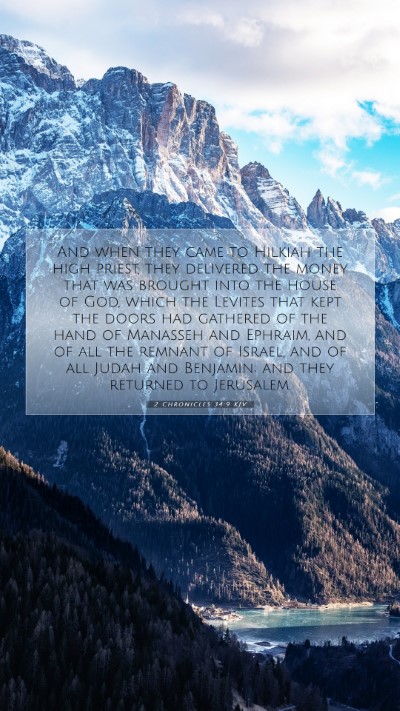Exploring the Meaning of 2 Chronicles 34:9
This passage, found in 2 Chronicles 34:9, provides profound insights into the nature of biblical reform and the significance of restoration in the context of Israel’s history. For those seeking a bible verse commentary or understanding Scripture, this analysis draws from esteemed public domain commentaries including those by Matthew Henry, Albert Barnes, and Adam Clarke.
Contextual Overview
In the narrative of 2 Chronicles, King Josiah's reign is marked by significant religious reforms aimed at returning the people of Judah to faithful worship of Yahweh. 2 Chronicles 34:9 specifically addresses the financial aspects of these reforms, highlighting the importance of provision for the temple's restoration.
Verse Breakdown
2 Chronicles 34:9 states:
“And when they came to Hilkiah the high priest, they delivered the money that was brought into the house of God, which the Levites that kept the doors had gathered of the hand of Manasseh and Ephraim, and of all the remnant of Israel, and of all Judah and Benjamin; and they returned to Jerusalem.”
Meaning and Interpretation
Gleaning insights from the commentaries:
- Matthew Henry: Henry emphasizes the significance of the collection gathered from the people, which reflects their commitment to restoring true worship. The involvement of various tribes indicates a unifying effort in their spiritual renewal. He notes the importance of the high priest as a central figure in reinstating correct practices of worship.
- Albert Barnes: Barnes points out the historical context of the collection, detailing how it was a response to the idolatry and neglect of worship due to previous kings. He sees this effort as indicative of a national awakening, where the people of Israel, having suffered under poor leadership, sought to return to their covenant obligations.
- Adam Clarke: Clarke provides insight into the typology of Christ in this verse, suggesting that just as the collected money was for the restoration of the temple, so too does Christ’s sacrifice bring restoration to believers. He notes the practical aspect of this restoration as a community initiative, emphasizing the unity and collaboration between the tribes.
Historical Context
This verse is situated in a pivotal moment for Judah. Under King Josiah, who came to the throne at a young age, there was renewed excitement regarding the worship of Jehovah after years of apostasy. The king's reforms included rediscovering the Book of the Law, which greatly influenced the people’s hearts (as noted in previous verses). Understanding this historical backdrop is essential for biblical exegesis and scripture analysis.
Application to Modern Life
For contemporary readers, the verse serves as a powerful reminder of the importance of community involvement in spiritual matters. Here are a few applications:
- Collective Responsibility: Just as the Israelites combined their resources for the temple's restoration, modern believers are encouraged to collaborate in their faith communities to foster spiritual growth.
- Restoration of Worship: The text underlines the need for ongoing reformation in worship practices, calling believers to evaluate their own practices against the teachings of Scripture.
- Engagement with Scripture: This passage can motivate believers to deepen their engagement with the Bible, seeking to understand and apply God’s instructions.
Related Bible Cross References
For further study, consider these cross-references that resonate with the themes found in 2 Chronicles 34:9:
- 2 Kings 22:4-7 – The similar account of Josiah’s reforms and the emphasis on collecting funds for the temple.
- Nehemiah 10:32-39 – A covenant commitment to support the temple and its services.
- Malachi 3:10 – God's encouragement for His people to bring their tithes and offerings into the storehouse.
Conclusion
This exploration of 2 Chronicles 34:9 illuminates themes of communal responsibility, the importance of temple worship, and the joy of restoration. Believers today can draw inspiration from this passage as they seek to apply similar principles in their own spiritual lives. For those engaged in bible study groups or online bible study sessions, this analysis provides valuable insights into the process of interpreting and applying scripture meaningfully.


